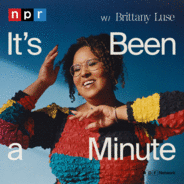
Kultur & Gesellschaft
It's Been a Minute Folgen
Want in on a secret? Your likes and dislikes didn't develop by accident. There are subtle and not-so-subtle forces around you, shaping what you think, how you act, and even who you think you are. Brittany Luse is here to break the spell and help you feel wiser in a society that makes things blurry.THE BEST POP CULTURE PODCAST AWARD WINNER AT THE 2025 SIGNAL AWARDSIt’s Been A Minute with Brittany Luse is the best podcast for understanding what’s going on in culture right now, and helps you consume it smarter. From how politics influences pop culture to how identity influences tech or health, Brittany makes the picture clearer for you every Monday, Wednesday, and Friday.It’s Been A Minute reaches millions of people every week. Join the community and conversation today.If you can't get enough, try It's Been a Minute Plus. Your subscription supports the show and unlocks a sponsor-free feed. Learn more at plus.npr.org/itsbeenaminute
Folgen von It's Been a Minute
-
Folge vom 24.10.2023The new "final girl" in horror; plus, who's afraid of a horny hag?Halloween is upon us — and it's the season for horror movies. Host Brittany Luse is a HUGE horror girlie, but loving horror also means critiquing it. Today, we're breaking down two major figures in horror: the final girl and the horny hag. First, Brittany chats with Dr. Kinitra Brooks, Audrey and John Leslie Endowed Chair of Literary Studies at Michigan State University, about what it means when the final girl is a Black woman. And later, Brittany is joined by horror author and film critic Gretchen Felker-Martin to discuss what's behind the horny hags in movies like X and Barbarian — and what that trope tells us about how we feel about older women in our society.Learn more about sponsor message choices: podcastchoices.com/adchoicesNPR Privacy Policy
-
Folge vom 20.10.2023Misinformation & uninformed comments are clogging war coverage; plus, Tupac's legacyA warning: This episode contains explicit language and mentions of rape.For the past two weeks, social media has been flooded with coverage and commentary on the conflict between Israel and Hamas. And while the news updates have been devastating, not everything coming across our feeds has been true. We've seen footage pulled from a video game purporting to show a Hamas fighter shooting down a helicopter, and a fake memo from the White House that claimed to announce $8 billion in military aid. This week, host Brittany Luse is joined by NPR correspondent Shannon Bond to learn why we're seeing so much misinformation online. Brittany is also joined by Molly McPherson, a crisis public relations expert, to unpack the hasty public statements about the conflict made by corporate brands and celebrities. They discuss how this may be indicative of a new media landscape that demands commentary and sentimentality.Then, we turn to Tupac Shakur. He is back in the news 27 years after his death, following the first arrest of a suspect connected to his murder. Joel Anderson, a Slate reporter who covered Tupac for the Slow Burn podcast, joins Brittany to discuss Tupac's complex impact and how the rapper has been able to stay relevant almost three decades after his passing.Learn more about sponsor message choices: podcastchoices.com/adchoicesNPR Privacy Policy
-
Folge vom 17.10.2023Code Switch: Baltimore teens are fighting for environmental justice — and winningFrom our friends at Code Switch, we present a story about one group of student activists in Baltimore and how their efforts to make their neighborhood healthier has them facing big coal — and actually making gains. Learn more about sponsor message choices: podcastchoices.com/adchoicesNPR Privacy Policy
-
Folge vom 13.10.2023Taylor Swift and Travis Kelce are 100% in a PR relationship. Here's how we know.Taylor Swift and her maybe boyfriend, Kansas Chiefs tight end Travis Kelce, have been inescapable the past few weeks. The pop superstar has been showing up at Chiefs games, and the NFL has been playing it up - all to the mutual benefit of each party involved. Regardless of if the three of them - Taylor, Travis, and the NFL - are in a romantic polycule, public relations expert Molly McPherson says they are for sure in a PR relationship. Brittany and Molly get into how PR relationships work for celebrities — from pop superstars to politicians.Plus, Taylor Swift released her Eras Tour film and Beyoncé announced her Renaissance Tour film a couple weeks ago. Brittany takes a look at whether these films add something for fans or if they are just another cash grab from these artists.Learn more about sponsor message choices: podcastchoices.com/adchoicesNPR Privacy Policy
